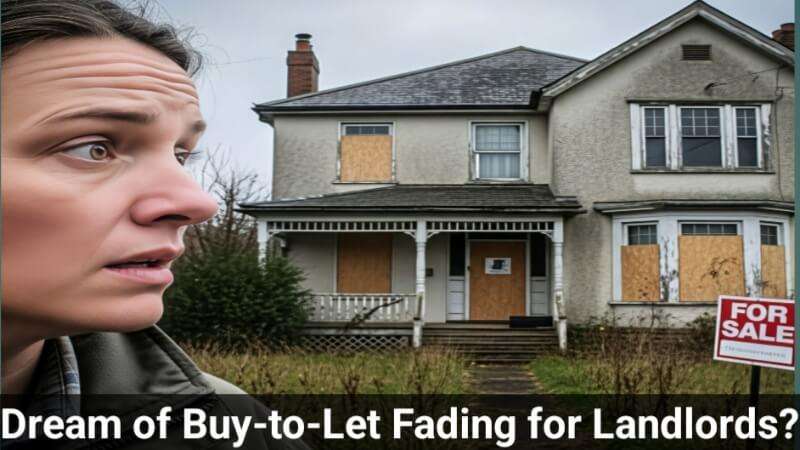Is the Dream of Buy-to-Let Fading for Landlords? For decades, investing in property was seen as a safe, lucrative path to wealth in the UK. The mantra was simple: buy a home, let it appreciate in value, and collect a steady rental income. However, a perfect storm of legislative changes, soaring costs, and economic pressures is now forcing many landlords to reconsider their once-secure investments. The question on everyone's mind is: is the game over for buy-to-let?
A Landlord's Lament: The Case of Eleanor Vance-Eleanor Vance, a 44-year-old marketing consultant, bought a two-bedroom flat in the vibrant London borough of Battersea a decade ago. She initially lived there herself, but after moving in with her partner, Leo, to a shared home in Surrey, she decided to rent it out. The plan was to generate a passive income and benefit from London’s famously buoyant property market. For a time, it worked. The flat, purchased for £520,000, provided a reliable stream of income.
However, like countless other landlords, Eleanor’s once-profitable venture has become a source of mounting stress and financial pressure. “It’s no longer the low-maintenance investment I thought it would be,” she explains. “Between the constant admin, the new regulations, and the rising costs, I’m questioning if the slim profit margin is worth the hassle.”
The Regulatory Onslaught: A Wave of New Rules-The upcoming Renter's Reform Bill, expected to be enacted by late 2025, is the primary source of concern for many landlords like Eleanor. This landmark legislation aims to rebalance the power dynamic between landlords and tenants, but investors fear it could cripple the sector. Key provisions of the Bill include:
Scrapping 'No-Fault' Evictions: Landlords will no longer be able to evict tenants without a valid, specified reason. This removes the 'Section 21' notice, which previously allowed landlords to reclaim their property with two months' notice, even for a periodic tenancy.
Periodic Tenancies: Fixed-term contracts will be replaced with periodic tenancies, meaning tenants can give two months' notice to leave at any time. Landlords, however, must provide four months' notice for an eviction, and even then, only for a handful of reasons, such as moving in themselves or selling the property.
Rent Control: The Bill limits rent increases to just once per year, and landlords must provide two months' notice. Tenants will also have the right to challenge rent hikes they believe are unfair via a tribunal.
Landlord Register: A new public register of landlords is being proposed, which some fear could become a "Trustpilot" for tenants to air grievances, while landlords have no similar recourse.
Eleanor fears the changes will lead to a constant churn of tenants, creating an administrative nightmare. “The hassle of a tenant turnover is the worst part,” she says. “Last time, Leo and I had to spend a full weekend cleaning, painting, and arranging furniture to get it ready for new occupants. It’s a huge time sink.”
A Financial Squeeze from All Sides-Beyond the new regulations, landlords are grappling with a series of financial hits. The government has steadily increased the tax burden on property investors over the last decade, but recent measures have intensified the pressure.
Stamp Duty Surcharge: Landlords now face a 3% stamp duty surcharge on top of the standard rates, making property acquisition significantly more expensive. For a £400,000 buy-to-let, this tax alone would amount to £23,000.
Mortgage Rate Hikes: The Bank of England’s interest rate hikes have sent buy-to-let mortgage costs soaring. A landlord with a typical £250,000 interest-only mortgage on a five-year fixed rate is now paying around £1,094 per month, a stark increase from the £625 they would have paid just a few years ago.
Rumours of National Insurance: Whispers are circulating in Westminster that the government is considering levying National Insurance on rental income, a move that would further erode profits already hit by the scrapping of mortgage interest relief.
The Exodus Begins: Landlords Selling Up-According to a recent report by Aldermore, nearly a third of landlords have already offloaded properties in the last year, and many more are considering their exit. The combination of legislative hurdles and financial pressures has made the market untenable for a growing number of investors.
For Simon Davies, a 38-year-old landlord based in Manchester, the decision to sell was an easy one. He owned seven properties but has already sold three, and plans to divest the rest. "The numbers just don't add up anymore," he states. "My properties are in more affordable northern areas, but even with rents of £700 per month, a single major repair can wipe out an entire year's profit. A new boiler or roof repair can be a five-figure cost."
Simon, who got into property to build a pension pot, says the mounting admin and tax burden have made the investment far more trouble than it's worth. He’s now looking at alternative options. “I’m transitioning my capital into a more diversified portfolio, including commercial property and the stock market. It’s just less of a headache, and the returns are looking better.”
The Unintended Consequences of Reform-While the Renter's Reform Bill aims to protect tenants, critics fear it may have the opposite effect. If a significant number of landlords follow Simon’s lead and sell up, it will reduce the supply of rental properties, driving up rents for those who remain. This could make an already challenging housing market even more difficult for renters.
As Eleanor Vance prepares to put her flat back on the market, her sentiments reflect a growing trend. “I’ve tried to sell it once, but the deal fell through. We’re now on a new two-year fixed-rate mortgage, but the plan is to sell as soon as that ends or our current tenants leave.”
The golden age of buy-to-let may not be over just yet, but the shine has certainly faded. For a generation of property investors, a once-simple path to wealth has become a complex, high-risk, and increasingly unappealing venture. The market is shifting, and for many landlords, the final chapter of their property journey is already being written.







.svg)
